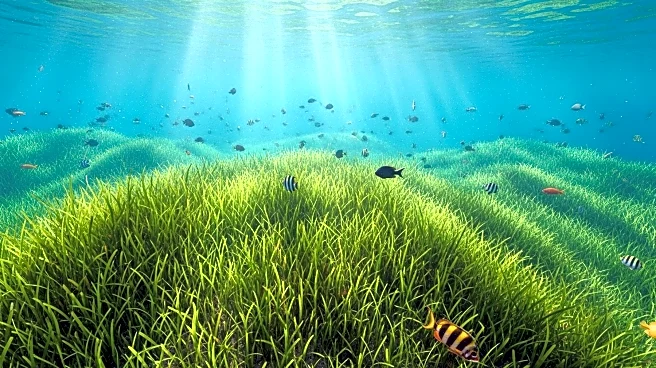What is the story about?
What's Happening?
A study conducted by the University of Liège at the STARESO marine research station in Calvi, Corsica, has highlighted the importance of the root microbiome in the survival of Posidonia oceanica seagrass meadows. These underwater ecosystems, crucial for stabilizing seabeds and storing carbon, are under threat from human activities and climate change. Researchers have been experimenting with transplanting seagrass cuttings to restore these meadows. The study found that the transplantation method significantly affects the root microbiome, which is essential for plant survival. Three techniques were tested: metal staples, coconut fiber mats, and potato starch structures. The study revealed that metal staples, which allow direct contact with sediment, promote beneficial bacteria essential for sulfur and nitrogen cycles, while other methods delay this colonization.
Why It's Important?
The findings underscore the need to consider microbiological factors in seagrass restoration efforts. Posidonia oceanica meadows are vital for marine biodiversity and carbon storage, acting as environmental sentinels. The decline of these ecosystems due to urbanization, boat anchoring, and climate change poses significant ecological risks. By understanding the role of the microbiome, restoration techniques can be improved to ensure the resilience and sustainability of seagrass meadows. This research opens up possibilities for inoculating beneficial bacteria or designing substrates that enhance root-sediment interaction, potentially leading to more effective conservation strategies.
What's Next?
The study suggests that future restoration efforts should incorporate microbiological dimensions to enhance the resilience of seagrass meadows. Researchers may explore the inoculation of beneficial bacteria or develop substrates that facilitate better root-sediment interaction. These approaches could lead to more sustainable and successful restoration techniques, helping to preserve these critical ecosystems. The findings may also influence policy decisions regarding marine conservation and the management of coastal areas.
Beyond the Headlines
The study highlights the intricate relationship between plant health and microbial communities, emphasizing the need for holistic approaches in ecological restoration. This research could inspire similar studies in other ecosystems, potentially leading to broader applications in environmental conservation. Understanding the microbiome's role in ecosystem resilience may also contribute to advancements in biotechnology and sustainable agriculture.














